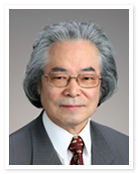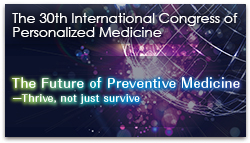Greetings

"[Personalized medicine] gives us one of the greatest opportunities for new medical breakthroughs that we have ever seen." -President Barack Obama [1]
The Precision Medicine Initiative (PMI) was launched with President Obama's State of the Union Address in January 2015. One year later, the National Cancer Moonshot (NCM) initiative was introduced in his final State of the Union Address as a strategic effort to end cancer. The NCM is a $1 billion initiative led by Vice President Joe Biden. It provides the funding necessary for researchers to accelerate the development of new cancer detection techniques and treatments, including new cancer-related research activities at the National Institutes of Health, Food and Drug Administration, and cancer research centers in the Departments of Defense and Veterans Affairs [2].
According to the report from the Personalized Medicine Coalition, to which the International Society of Personalized Medicine (ISPM) belongs, the Obama administration announced the next steps for the PMI-including efforts to encourage data sharing, enroll 79,000 people in a research cohort by the end of the year, and establish a coordinating center to guide the PMI's work-during the PMI Summit at the White House on February 25 [3]. The ambitious policies involving the PMI have placed a national spotlight on personalized medicine, and the US government's strong stance in supporting this field has had a significant impact on us.
Last November, I had the opportunity to listen to the speech about the Danish Biobank System by leaders of the national project in Denmark. It is known among advanced countries that the Danish Biobank System is the ideal arrangement for compiling medical information in a database through a national initiative. There are a number of historic biobanks, including the world's oldest cancer biobank in Denmark. The centralized Danish Civil Registration System (CRS), established in 1968, provides a personal identification numbering system for all residents of Denmark. The CRS enables the efficient and comprehensive linkage of information among networks of clinical databases with biological specimens held in biobanks. Electronic Health Records (including information on disease diagnosis, treatments, and medication history) can be used by researchers throughout the world as they collaborate with researchers in Denmark. By analyzing biological materials and big data in healthcare, the national project has been useful for improvement of clinical outcomes and the development of new drugs based on personalized medicine [4].
Since last April, the Japan Agency for Medical Research and Development (AMED) has established and maintained research and development in the medical field effectively and seamlessly to promote integrated medical research and development (from basic research to practical application) by the strategic and priority allocation of funds. Social implementation of genomic medicine and the promotion of research in regenerative medicine are targeted as AMED goals in 2016. Anticipation is high that AMED will advance collaborative researches, personnel exchanges, and data sharing of research outcomes by building domestic and international networks. It is expected to play an important role as an incubator for innovations in the medical and life sciences field in Japan [5].
In view of these situations in the US, Denmark, and Japan, it is easy to understand that the environment surrounding personalized medicine has shifted discussions from the national level to the global level. Implementing clinical trials in a small country or region can be a challenge. Improvement is needed in a nation's medical foundation, but a cross-border working collaboration is also important to promote and accelerate research and development for intractable and rare diseases, provide personalized prevention plans, and allocate medical expenses appropriately. A key for advancing personalized medicine efficiently and productively is engaging in global partnerships.
The aim of Precision Medicine is the same as the aim of personalized medicine, which ISPM promotes. Our goal is the realization of medical innovation, including the selection and establishment of the best drugs and treatments for individuals according to personalized prediction and prevention of disease in consideration of all kinds of information-not only the precise medical information by next-generation sequencers, but also information regarding personal environments and lifestyles.
We would like to express our profound appreciation and gratitude to the ISPM members and supporters. We hope many medical professionals, researchers and healthcare professionals who endorse our prospectus will join us and look forward to acting together.
Respectfully,
Hiroyuki Abe, MD, PhD, FACC
President, International Society of Personalized Medicine
References
| [1] | President Obama, State of the Union Address 2015, "Education Advocacy Impact," 2015 Annual Report of Personalized Medicine Coalition; p 2. |
| [2] | The White House Fact Sheet: Investing in the National Cancer Moonshot, https://www.whitehouse.gov/the-press-office/2016/02/01/fact-sheet-investing-national-cancer-moonshot |
| [3] | C. Wells, "White House Announces Next Steps for Precision Medicine Initiative," Personalized Medicine in Brief 2016; Personalized Medicine Coalition; p 16. |
| [4] | Professor Stephen J. Hamilton-Dutoit, "The Danish Biobank System-A Unique Resource for Biomedical Research and Development," Speech given November 10, 2015. |
| [5] | Website: Japan Agency for Medical Research and Development http://www.amed.go.jp/en/ |







